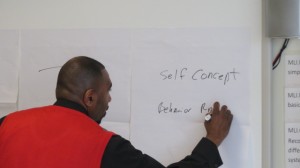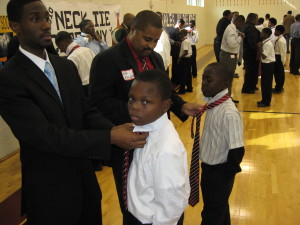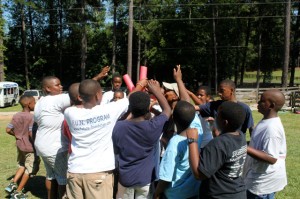The Rites of passage in many cultures denotes the entry into adulthood by teens. For many cultures, the rites of passage is  normally limited to that of the male’s official entry into manhood and him being given due respect to be treated as a man of responsibility. But in America there are very few rites of passage left or even observed since most our young teenagers are exposed to and do things that in past times were only reserved for this(rites of passage) special occasion. So now, because of the lack of male figures in the home for most boys, the young teenagers have to create their own rites of passage to mark their transition from childhood into adulthood. This is a very interesting dilemma because modern society has removed the majority of the positive traditional rites of passage and left our young male teenagers unable to mark a specific time for celebration, commemoration, or show that they have become men, of enlightenment.
normally limited to that of the male’s official entry into manhood and him being given due respect to be treated as a man of responsibility. But in America there are very few rites of passage left or even observed since most our young teenagers are exposed to and do things that in past times were only reserved for this(rites of passage) special occasion. So now, because of the lack of male figures in the home for most boys, the young teenagers have to create their own rites of passage to mark their transition from childhood into adulthood. This is a very interesting dilemma because modern society has removed the majority of the positive traditional rites of passage and left our young male teenagers unable to mark a specific time for celebration, commemoration, or show that they have become men, of enlightenment.
A rite of passage is a ritual event that marks a person’s transition from one status to another. The rite of passage also explores and describes various notable mile stones in an individual’s life. In psychology, the term ritual is sometimes used in a technical sense for a repetitive behavior systematically used by a people or person to neutralize or prevent anxiety. So the rites of passage ceremonies, from boys to men are imperative, but one of the key components is to have honorable men initiate the passage. Now there are many different passages in our lives, if we choose to mark and celebrate them. The ideal goal is to design the rites of passage experiences to assure that initiates (young male teenagers) come out of the experience with a new and empowering start that helps them take responsibility for the decisions that set the course of their future lives.
 To also help initiates create the story of who they are and the kind of life they want to build based within the exploration of their own personal values. The rites of passage should also help them find the story that connects them to their community. Hopefully through this self-exploration initiates emerge with a stronger sense of personal responsibility to all aspects of their lives and begin reaching out to the larger world of which all living things are a part of. In this way both the community and the initiates benefit from rites of passage. An intentional rites of passage experience provides the space for the community to transmit its core values and confer the role responsibilities appropriate to the initiate’s stage of life, thus insuring cultural continuity, a sort of knitting or bringing together of the generations.
To also help initiates create the story of who they are and the kind of life they want to build based within the exploration of their own personal values. The rites of passage should also help them find the story that connects them to their community. Hopefully through this self-exploration initiates emerge with a stronger sense of personal responsibility to all aspects of their lives and begin reaching out to the larger world of which all living things are a part of. In this way both the community and the initiates benefit from rites of passage. An intentional rites of passage experience provides the space for the community to transmit its core values and confer the role responsibilities appropriate to the initiate’s stage of life, thus insuring cultural continuity, a sort of knitting or bringing together of the generations.
What are some of the reasons for this boy to men initiation? Well, the main purpose of the boys to men initiation function is to reveal the deep meaning of existence to the new male generation and to help them assume the responsibility of being truly men and hence their role of participating in that cultural life. Many of the most important and common rites of passage are connected with the biological changes (crises) of the young male teenager, or milestones, of life-birth, maturity, reproduction and death- that bring changes in social status and therefore, in the social relationship of the people in that community.
Rites of passage are universal, and presumptive evidence from archaeology (in the form of burial findings) strongly suggests that they go back to very early times.  Passage rites and other events have in the past been the primary socially approved means of participating in pleasurable activities, and has been a primary vehicle for art, music, song, dance, and other forms of aesthetic experience. The worldwide observance of these rites long ago attracted the attention of scholars, but the first substantial interpretation of them as a class of phenomena was presented in 1909 by the French Anthropologist and Folklorist Arnold van Gennep, who coined the phrase “rites of passage.” From its beginning, the study of rites of passage has attempted to account for similarities and differences between the rites of different societies. The similarities are striking and most certainly reflect the close similarity in ways of human thought.
Passage rites and other events have in the past been the primary socially approved means of participating in pleasurable activities, and has been a primary vehicle for art, music, song, dance, and other forms of aesthetic experience. The worldwide observance of these rites long ago attracted the attention of scholars, but the first substantial interpretation of them as a class of phenomena was presented in 1909 by the French Anthropologist and Folklorist Arnold van Gennep, who coined the phrase “rites of passage.” From its beginning, the study of rites of passage has attempted to account for similarities and differences between the rites of different societies. The similarities are striking and most certainly reflect the close similarity in ways of human thought.

